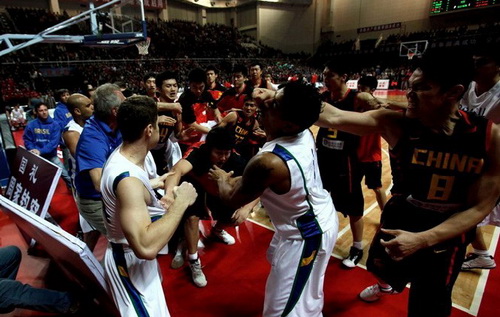Should the Chinese Men's Basketball Team Have to Apologize?
Economic Observer Online
October 13, 2010
Translated by Leslie Walczak
Original: [Chinese]
The Chinese men's basketball team is at it again - following brawls with Lebanon in 2001 and a notorious "night of shame" punch up with the Puerto Rican team in Beijing in 2005, yet another brawl involving the team broke out during a friendly in Henan against the Brazilian national team on Tuesday night.
So what's behind the Chinese basketball team's apparent love of fighting?
After the fight with Brazil, China's head coach Bob Donewald told the press that the team acted in self-defense, having endured persistent rough play from the Brazilians, including a foul on Zhang Qingpeng that resulted in him sustaining a concussion and being sent to hospital.
Although the coach's words have some validity, the Chinese team itself wasn't playing that clean either. Additionally, the coach's own irate behavior early in the game (he was given a technical foul for disputing a call), also likely encouraged the players' later violent reactions.
Interestingly, whenever a brawl involving the Chinese basketball team occurs, the Chinese team always wins the fistfight, but does not necessarily win the basketball game.
Perhaps this determination to win the fight is actually in keeping with previous head coach Jonas Kazlauskas' speech after the notorious 2005 brawl with the Puerto Rican team. In his speech, Kazlauskas told the team that if a fight breaks out and the Chinese appear to lose, other international teams will believe that the Chinese basketball team is weak and will use foul play as a tool in future matches.
What Kazlauskas said does make some sense, back in 2007 when the Chinese Olympic football squad were involved in a punch-up during an unofficial friendly in England with the Queen's Park Rangers side, the fight resulted in a Chinese team member's jaw being broken and, in the view of many Chinese football fans, China gaining a reputation for not only playing poor football but also not being much good at fighting either. To add insult to injury, China's Football Association required the team to issue a formal apology to QPR. The apology greatly damaged the reputation of the Chinese soccer team.
Some violence in sports is to be expected and of course we should continue to criticize these outbreaks and educate players - but there's no need to lift the issue to the level of high politics and go so far as to require the team to apologize to the opposing team and to the country.
First of all, it's unnecessary to do so, all these so-called apologies and promises never to engage in this kind of behavior again, don't mean a thing.
During the passion of the game, no player is going to be able to remember a former commitment and adopt some "official attitude".
Just look at Zhu Fangyu, who after taking part in the 2005 brawl was fined, apologized and made a commitment not to make the same mistake again - but this time, he was once again involved in the brawl.
In addition, the fact that so many players took part, when seen from another angle, indicates that the team is united and courageous.
Despite all this, fighting is of course wrong. The issue is that some players do not seem to have a clear understanding of what is real courage and how it should be used, especially when under the pressure of deliberate provocation from an opponent.
Can they remain focused when taunted by an opponent?
Can they continue to play by the rules despite such provocation?
Unless players can retain their cool, it will be the Chinese team that will suffer the consequences.
For example, the team might receive a fine or suspension from FIBA which would be especially damaging on the eve of the upcoming Asian Games.
Update: The Chinese Basketball Association announced yesterday that it was taking responsibility for the fight, saying that the conflict exposed deficiencies in the league's management and education. The association also announced that while they had not yet decided on whether they would punish individual players, but that training will be halted immediately in order to focus on developing sportsmanship and integrity. Whether the International Basketball Federation will punish any of the involved players is still unknown.
Links and Sources
Tudou: Video of Brawl
Sina: Report of Apology from Chinese Basketball Association
Yangcheng Evening News: Gallery
This article was edited by Paul Pennay
The views posted here belong to the commentor, and are not representative of the Economic Observer |
Related Stories
Popular

- ADVERTISING
- Interview with Sir Martin Sorrell - Chief Executiv...
- The EO sits down with the chief executive of the world's largest advertising group
Interactive
Multimedia

- EEO.COM.CN The Economic Observer Online
- Bldg 7A, Xinghua Dongli, Dongcheng District
- Beijing 100013
- Phone: +86 (10) 6420 9024
- Copyright The Economic Observer Online 2001-2011
















